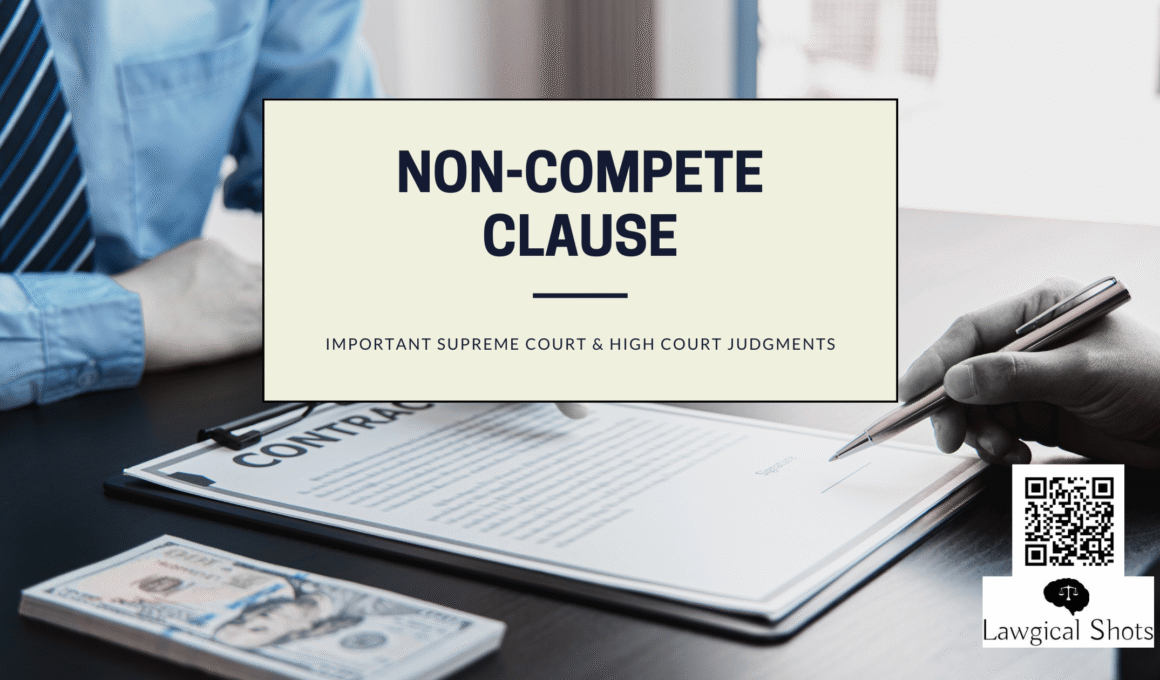If you are a corporate employee, you must have signed an employment contract which contains several terms and conditions of work. At times, an employment contract also contains something termed a non-compete clause. It could be a separate non-compete agreement as well. Since it restricts employment in competing businesses, are you supposed to switch industries after resignation? There are several judgments on non-compete clause by the Supreme Court and several High Courts which clear the clouds on enforceability of negative covenant. Here is a detailed discussion on the legal position of “non-compete” in employment contracts and otherwise.
What is a Non-Compete Clause?
In standard employment contracts, a clause may be included wherein certain restrictions are imposed on an employer after termination. It mostly pertains to restrictions on employment or engagement with a competent entity. It means that such a person shall not be permitted to work in competing businesses during a specific period.
Contract Law on Non-Compete Agreement
Section 27 of Indian Contract Act, 1872 holds a contract void if it restrains someone from exercising a lawful profession, trade, or business. The Courts have clarified that negative covenants or non-compete agreements can be enforceable to the extent of reasonableness. Judgments on non-compete clause seek to specify the purpose of protecting legitimate business interests.
Supreme Court Judgments on Non-Compete Clause
Percept D’Markr (India) Pvt Ltd v. Zaheer Khan (2006)
The matter pertains to agreement between the petitioner and former cricketer Zaheer Khan, allegedly in restraint of trade. The Court remarked that the clause in question contained restrictive covenant restraining trade against Zaheer Khan from future liberty to deal with the persons he chooses for his endorsements, promotions, advertising or other affiliation. The Court expressed that such type of restriction going beyond tenure was affected by Section 27 of Contract Act and was therefore void. It was noted that “neither the test of reasonableness nor the principle of the restraint being partial would be applicable unless it falls in the exception carved out in Section 27. The exception which relates to the sale of the goodwill of a business is not applicable.”
M/S Gujarat Pottling Co. Ltd. v. The Coca Cola Co. (1995)
The Supreme Court in this non-compete clause judgment addressed the extent of applicability of the doctrine. The Court explained that “Traditionally the doctrine of restraint of trade applied to covenants whereby an employee undertakes not to compete with his employer after leaving the employer’s service and covenants by which a trader who has sold his business agrees not thereafter to compete with the purchaser of the business. The doctrine is, however, not confined in its application to these two categories but covenants falling in these two categories are always subjected to the test or reasonableness. Since the doctrine of restraint of trade is based on public policy its application has been influenced by changing views of what is desirable in the public interest. ”
Superintendence Company of India v. Krishan Murgai (1980)
In this case, the Court delineated the position of an employer and that of a purchaser with reference to competition. The Court expressed that “There exists a difference in the nature of the interest sought to be protected in the case of an employee and of a purchaser and, therefore, as a positive rule of law, the extent of restraint permissible in the two types of case is different. The essential line of distinction is that the purchaser is entitled to protect himself against competition on the part of his vendor, while the employer is not entitled to protection against mere competition on the part of his servant. In addition thereto, a restrictive covenant ancillary to a contract of employment is likely to affect the employee’s means or procuring a livelihood for himself and his family to a greater degree than that of a seller, who usually receive ample consideration for the sale of the goodwill of his business…….The restraint may not be greater than necessary to protect the employer, nor unduly harsh and oppressive to the employee.”
Niranjan Shankar Golikari v. The Century Spinning and Mfg. Co. (1967)
The judgment on non-compete agreement addressed an important facet – whether restriction during employment was lawful. The Court clarified that “Negative covenants operative during the period of the contract of employment when the employee is bound to serve his employer exclusively are generally not regarded as restraint of trade and therefore do not fall under section 27 of the Contract Act. A negative covenant that the employee would not engage himself in a trade or business or would not get himself employed by any other master for whom he would perform similar or substantially similar duties is not therefore a restraint of trade unless the contract as aforesaid is unconscionable or excessively harsh or unreasonable or one sided”.
Non-Compete Clause Judgments by High Courts
Varun Tyagi vs Daffodil Software Pvt Ltd (2025)
The matter pertained to the validity of non-solicitation and non-compete clause in the employment agreement. The Delhi High Court observed that “An employee cannot be confronted with the situation where he has to either work for the previous employer or remain idle. In employer-employee contracts, the restrictive or negative covenant are viewed strictly as the employer has an advantage over the employee and it is quite often the case that the employee has to sign standard form contract or not be employed at all.”
The Court clarified the settled law that a negative covenant post employment termination can only pertain to protection of confidential and proprietary information or restriction against solicitation of employer’s clients.
Zee Media Corp. Ltd. v. Palki Sharma Upadhyay (Order dated November 22, 2022)
Zee Media approached the Delhi High Court against renowned News Reporter Palki Sharma, alleging violation of notice period policy and breach of terms of Appointment Letter. The Court expressed that “since it is inequitable to prevent an individual from using, deploying and monetizing his or her skills in a given field, no case is made-out for grant of any injunctive relief preventing the defendant from continuing with her employment, even if it is in a competitor company or TV channel.”
However, the Delhi High Court restricted Palki Sharma from divulging, using or employing any confidential or other information pertaining to Zee Media.
M/S Stellar Information Technology v. Rakesh Kumar (2016)
Usually, the Judgments on Non-Compete Clause look at the employee’s right to work and nature of business. However, in this case, the Delhi High Court looked at the non-compete clause itself. The Court pointed towards the inbuilt exception wherein the employee could prove carrying out business activity without using confidential information. The Court illuminated that “Once it is held that in the guise of a confidentiality clause, the Plaintiff is attempting to enforce a covenant in restraint of trade, the same must be held to be void.”
Ozone Spa Pvt. Ltd. v. Pure Fitness (2015)
The Bombay High Court discussed the aspect of enforcement of negative covenant in a contract. The Court hinted at the settled law that “the negative covenants contained in the agreement which are aimed at to operate during the subsistence/ validity of the agreement in a commercial contract can be validly enforced and injunction for enforcement of the said covenant cannot be refused on the ground that the same are in restraint of the trade as the underlying purpose of the said negative covenant prohibiting the party to conduct the competing business is to serve the contractual relationship and there exists no such restraint of trade in such a case as the party so restricted is already doing the business as per commercial arrangement under the contract.”
Embee Software Pvt. Ltd v. Samir Kumar Shaw (2014)
The Calcutta High Court considered an application for amendment of pleadings to implead a defendant carrying on competing business after resigning the petitioner’s company. There were allegations of misusing the petitioner’s trade secret and copyright in computer programmes. Thus, the Court allowed amendment of pleadings in this case.
Kuoni Travel (India) v. Ashish Kishore (2007)
The Bombay High Court dealt with applications seeking ad-interim relief based on contractual terms and conditions of employment, having non-compete and Garden Leave Clauses. The Court opined that “a restrictive covenant can operate only during the employment period. But, that does not mean that restrictions cannot be imposed so as to ensure that doctrine of restraint regarding the trade secrets after the employment or service period has come to an end.”
Wipro Ltd. v. Beckman Coulter International SA (2006)
Owing to the Canvassing Representative Agreement between the parties, the petitioner sought restraining orders against the respondent from employing any person employed with the petitioner in present or past, during pendency of arbitration proceedings. Looking at the non-compete clause judgments and the agreement itself, the Court ensured that the restriction was on the petitioner and respondent (the employers) and not the employees. Thus, the Court restrained any advertisements or solicitation of employees during pendency of arbitration proceedings. The Court held Wipro employees free to take up employment even for ad held to be solicitation, while the respondent would be liable to compensate Wipro for breach.








